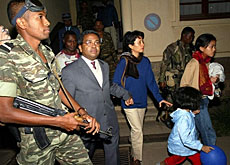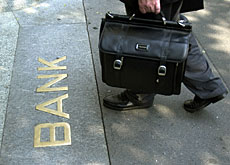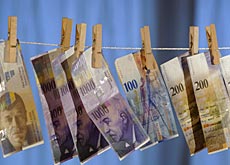Madagascan money laundering case dropped

The Swiss federal prosecutor has abandoned an investigation into suspected money laundering involving the former prime minister of Madagascar.
As a result a Swiss bank will refund SFr2.8 million ($2.3 million) to Tantely Andrianarivo, a move that has “disappointed and shocked” the Madagascan government, which has demanded the money back.
Benoît Girardin, the Swiss chargé d’affaires in Madagascar, said on Thursday that the federal prosecutor had recently decided to end the three-and-a-half-year investigation.
He added though that Andrianarivo was not absolved of the charges, but pointed out there had been a lack of irrefutable evidence.
“Formal, solid, unquestionable proof for the unauthorised source of these funds could not be produced,” he said.
Girardin added the money was no longer blocked, but the 52-year-old former prime minister would have to incur the costs of the investigation.
The chargé d’affaires said he had passed the prosecutor’s decision on to the Madagascan government, which wanted to know how it could recover the money.
The Madagascan finance minister announced on Wednesday the government would “react and protest.”
Political payback?
René Tantely Gabrio Andrianarivo was prime minister of Madagascar from July 1998 to May 2002 under Marxist President Didier Ratsiraka.
In December 2003 he was convicted of embezzlement and “endangering the state” and was sentenced to 12 years of hard labour and fined $7 million (SFr8.5 million).
The fine was intended to pay back government funds that were allegedly illegally withdrawn.
Andrianarivo, who lives in exile in France, described the verdict as a “political settlement”. According to Amnesty International, the trial was “marred by irregularities”.
The former prime minister was allowed to leave Madagascar afterwards to seek medical treatment abroad.
The Swiss federal prosecutor opened the investigation into Andrianarivo at the end of 2003 following information from a Swiss bank that had noticed “suspicious” payments into one of its accounts.
According to Girardin, the Swiss authorities had been considering handing back the funds in a similar way to the accord found with the Nigerian government for the restitution of assets stolen by the late Nigerian dictator Sani Abacha and his associates.
swissinfo with agencies
Money laundering involves concealing the origins of money earned through criminal activities and releasing it unnoticed into legitimate business activities.
It is most commonly associated with drug trafficking, but not exclusively.
The Swiss Money Laundering Act obliges all financial intermediaries to identify all clients and to establish the beneficial owners of the assets.
They must also report any suspicion of money laundering to the authorities and freeze related assets.
The number of reports on suspicious transactions submitted to the Money Laundering Reporting Office of Switzerland reached 729 in 2005 – down more than 11% on the previous year.
In 2004 assets amounting to SFr779 million were blocked, but only SFr680 million in 2005.

In compliance with the JTI standards
More: SWI swissinfo.ch certified by the Journalism Trust Initiative












You can find an overview of ongoing debates with our journalists here . Please join us!
If you want to start a conversation about a topic raised in this article or want to report factual errors, email us at english@swissinfo.ch.